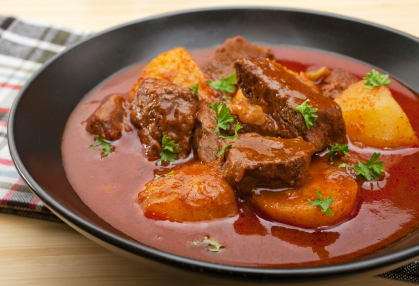 Loading... Please wait...
Loading... Please wait...
WE DELIVER! 6328140854
Pages
- Home
-
Consult/GetAdvice
- Workshops
-
Grow your Own Food
- About Us
-
Blog
-
Learn
- Why you should be eating Slow Growing, Heritage Breed, Pasture-raised Chickens
- The Philippine Cattle Industry: An Introduction
- Biodynamic Food: Healthier & Tastier
- Grass Fed Beef v. Imported v. Grain
- Understanding Meat Terms: Grass Fed, Pastured and Organic
- Pasture-raised v. Free-range Chickens
- Questions to ask to ensure you're buying Grass Fed Beef
- Storing and Handling Beef
- Cooking Grass Fed Beef to Perfection
- Cooking Grass Fed Steak
- Grass Fed Beef: More Health Benefits
- Grass Fed Beef: Lower in Fat, Calories, High in Omega-3s
- Grass Fed Beef: Healthier Meat than Chicken
- FAQ
-
Contact

1. We recommend moist heat methods for cooking your grass fed beef. As grass fed beef is extremely low in fat, cooking methods that utilize a lot of moisture will keep the meat tender. Moist heat cooking methods include braising and stewing. This allows the slow-cooking of meat in a lot of juices, including stocks, sauce and wine, making it exquisitely tender and full of flavor. Our favorite grass fed dishes have been beef stews and casseroles.
2. If you are planning to sauté, grill or roast, do not overcook. You lose essential nutrients from overcooking. Overcooking is your biggest culprit for tough grass fed beef. This is because grass-fed beef does not have a lot of fat to keep it moist when cooked too long or at high temperatures. Grass-fed beef needs about 30% less cooking time than most common beef and is best if cooked medium-rare to medium, or it will be too tough. When cooking grass-fed beef with dry-heat methods, make sure to always sear the beef over high heat, then continue cooking it at a lower temperature either in a pan, on the grill or in the oven, depending on the method you're using and the recipe.
3. Since your beef is low in fat, coat in olive oil or palm oil.
4. Do not cook when frozen or partially frozen. Thaw the meat in the refrigerator or under cold running water. Do not microwave.
5. We also recommend the Jaccard meat tenderizer (we bought ours at True Value.) If you do not own a Jaccard, we recommend marinating your beef before cooking. Choose a recipe that doesn't mask the delicate flavor of grass fed beef but enhances the moisture content. A favorite marinade using lemon, Braggs, vinegar, wine, or beer is a great choice. If you do not have time to marinate or own a tenderizer, just coat your thawed meat with your favorite rub, place on surface, cover and pound a few times to break down connective tissue. Use a mallet, a rolling pin or whatever is safe or convenient.
6. Let the beef sit covered and in a warm place for 8 to 10 minutes after removing from heat to let the juices redistribute.
7. Never use a fork to turn your beef as precious juices will be lost. Always use tongs.
8. If you're preparing hamburgers with grass-fed beef, add caramelized onions or other moisturizing ingredients to compensate for the leaner meat. (Grass-fed hamburgers are generally 80% to 90% lean.)
Enjoy your perfect grass fed experience and be a convert for life!
Taken in part from www.sustainabletable.org and americangrassfedbeef.com
